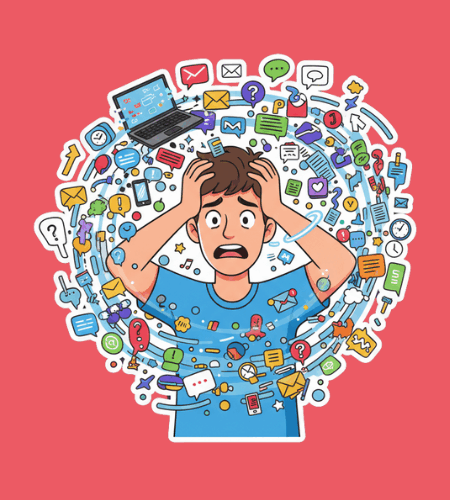Information Overload Day is observed every year on October 20. This day is dedicated to bringing attention to the challenges of living in a world flooded with digital information, and encouraging folks to pause, reset, and manage their “information diet.”
Table of Contents
History of Information Overload Day
The observance was initiated in 2009 by analyst Jonathan Spira, as his research firm identified information overload as a major concern for modern knowledge workers. That year, the first event was held on August 12. Soon after, the date was shifted to October 20, where it has been commemorated ever since.
The idea was to cast a spotlight on how the constant stream of emails, notifications, news, and media can overwhelm our capacity to think clearly, make decisions, and maintain mental well‑being. Over time, the day has grown in recognition among digital workers, productivity advocates, and mental health communities as a small intervention in a hyperconnected age.
Why Information Overload Day matters
We often assume that more information is always better. Yet, when our brains are taxed with too many inputs, creativity, clarity, and true understanding can suffer. Recognizing Information Overload Day helps us admit that we are human—not data machines—and that it’s okay to pull back, reduce noise, and focus.
This observance also serves as a reminder that technological convenience comes with the responsibility of moderation. It invites organizations, software developers, and individuals to think about how to design systems, tools, and personal habits that help filter, prioritize, and protect attention—rather than simply amplifying every signal.
- It highlights the real costs—mental and emotional—of constant information bombardment
- It encourages reflection on how we consume, share, and prioritize information
- It supports the development of healthier digital habits (rules, boundaries, filters)
- It advocates for workplaces and systems that respect focus, not just connectivity
- It normalizes stepping back and disconnecting without guilt
How to Celebrate or Observe Information Overload Day
On October 20, consider giving yourself a break from screens, notifications, and nonessential media. You might try a digital detox for a few hours—or even the full day—letting your brain rest from the stream of alerts. Replace that time with analog activities: reading a physical book, going for a walk, journaling, or simply reflecting in silence.
You can also make it more structured: unsubscribe from unnecessary mailing lists, mute or delete distracting apps, set up filters, or designate “no‑notification hours.” If you’re in a work setting, suggest a meeting‑free afternoon, an “offline hour,” or a policy of sending fewer, more intentional emails. Share with others your intention to reset and invite them to join you in the pause.
Some ideas to practice:
- Turn off noncritical notifications on phone and computer
- Check email just a few times during the day instead of constantly
- Unsubscribe from mailing lists and filter out noise
- Replace screen time with a calming offline activity
- Propose a “digital quiet period” at work or in a group
Information Overload Day Dates Table
| Year | Date | Day |
|---|---|---|
| 2026 | October 20 | Tuesday |
| 2027 | October 20 | Wednesday |
| 2028 | October 20 | Friday |
| 2029 | October 20 | Saturday |
| 2030 | October 20 | Sunday |
Subscribe to our newsletter and never miss a holiday again!

